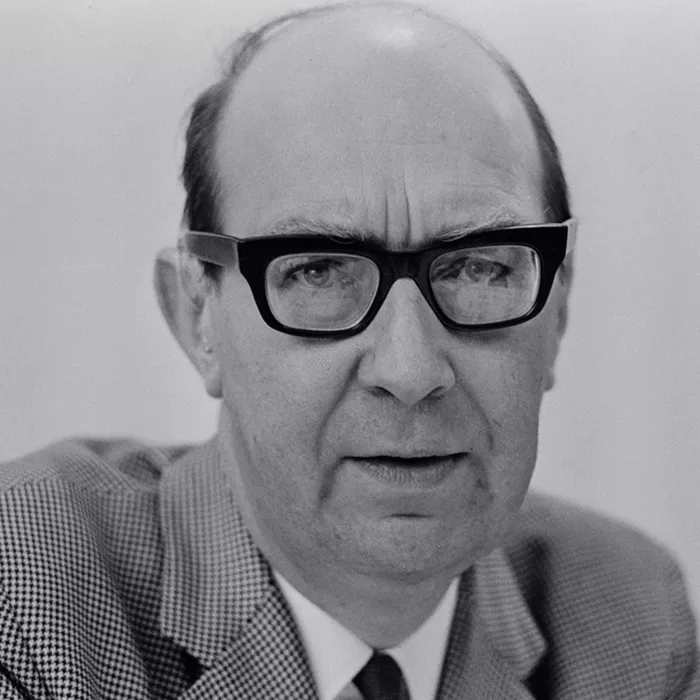
Philip Larkin (1922–1985) was one of Britain’s most celebrated post-war poets, known for his candid, reflective, and often poignant explorations of modern life. His verse, characterized by formal precision and conversational tone, offers profound insights into themes of love, mortality, and the passage of time. Larkin’s enduring legacy lies in his ability to articulate universal human experiences with wit and clarity.
Philip Larkin Biography
Philip Arthur Larkin was born on August 9, 1922, in Coventry, England, to Sydney Larkin, a city treasurer with Nazi sympathies, and Eva Larkin, a reserved homemaker. This blend of a strict, ideologically charged household and a sensitive maternal influence shaped Larkin’s worldview, fostering his appreciation for solitude and skepticism toward conventional ideals.
Larkin attended King Henry VIII School in Coventry and later studied English at St. John’s College, Oxford, where he developed a love for poetry and formed lifelong friendships, including with novelist Kingsley Amis. During his time at Oxford, Larkin’s myopia and poor health exempted him from military service during World War II, allowing him to focus on writing.
After graduating in 1943, Larkin worked as a librarian, first in Wellington, then Leicester, and later Belfast. It was during his tenure at the University of Hull, beginning in 1955, that Larkin found both professional stability and a fertile environment for his poetic output. As a librarian, Larkin was deeply committed to his work, balancing it with his creative pursuits.
Larkin’s literary career took off with the publication of The Less Deceived (1955), followed by The Whitsun Weddings (1964) and High Windows (1974). These collections established him as a leading voice in post-war British poetry. His works often captured the ordinariness of life, filled with sharp observations and an underlying sense of existential unease.
Though Larkin avoided the literary spotlight, eschewing public readings and appearances, he received numerous accolades, including the Queen’s Gold Medal for Poetry in 1965. Despite declining the role of Poet Laureate in 1984, he remained a beloved figure in British letters until his death from cancer on December 2, 1985.
Larkin’s legacy is multifaceted: as a poet, his verse remains a testament to his mastery of language and emotional depth; as a librarian, he revolutionized library services; and as a cultural commentator, his insights continue to spark debate and admiration.
Philip Larkin Poems
Larkin’s poetry is lauded for its accessibility, emotional depth, and technical precision. Below is an overview of some of his most influential works:
1.“Church Going”
In this reflective poem, Larkin examines the fading role of religion in contemporary life. It captures his ambivalence toward faith and the enduring need for rituals.
2.“The Whitsun Weddings”
Inspired by a train journey, this narrative poem explores marriage and societal expectations, blending keen observation with a contemplative tone.
3.“High Windows”
A meditation on generational shifts and the erosion of traditional values, this poem is both provocative and wistful.
4.“This Be The Verse”
Perhaps his most famous poem, it delivers a sardonic take on familial dysfunction with its opening line: “They f*** you up, your mum and dad.”
5.“An Arundel Tomb”
A poignant exploration of love and legacy, this poem examines the enduring power of a medieval tomb to evoke universal emotions.
6.“Aubade”
A powerful confrontation with mortality, Aubade reveals Larkin’s fear of death in stark, haunting terms.
7.“Mr. Bleaney”
This poem portrays the bleakness of an ordinary life through the lens of a rented room’s transient occupants.
8.“Love Songs in Age”
A melancholic reflection on aging and unfulfilled romantic ideals, this poem encapsulates Larkin’s gift for emotional resonance.
9.“MCMXIV”
A nostalgic look at the innocence lost to World War I, this poem mourns the end of an era with vivid imagery.
10.“Dockery and Son”
A meditation on the passage of time and the choices that shape lives, this poem reflects Larkin’s introspective nature.
Through these poems, Larkin invites readers to confront life’s complexities with honesty and empathy, making his work both timeless and profoundly human.
Philip Larkin Quotes
1.“What will survive of us is love.”
2.“Life has a practice of living you, if you don’t live it.”
3.“The past is not a package one can lay away.”
4.“Sex means nothing—just the moment of ecstasy, that flares and dies in minutes.”
5.“Books are a load of crap.” (This Be The Verse)
6.“Deprivation is for me what daffodils were for Wordsworth.”
7.“We are not suited to the world. And the world does not suit us.”
8.“Happiness writes white; it does not show up on the page.”
9.“Most things are never meant.”
10.“Days are where we live. They come, they wake us time and time over. They are to be happy in.”
Philip Larkin Facts
1.“What will survive of us is love.”
2.“Life has a practice of living you, if you don’t live it.”
3.“The past is not a package one can lay away.”
4.“Sex means nothing—just the moment of ecstasy, that flares and dies in minutes.”
5.“Books are a load of crap.” (This Be The Verse)
6.“Deprivation is for me what daffodils were for Wordsworth.”
7.“We are not suited to the world. And the world does not suit us.”
8.“Happiness writes white; it does not show up on the page.”
9.“Most things are never meant.”
10.“Days are where we live. They come, they wake us time and time over. They are to be happy in.”
